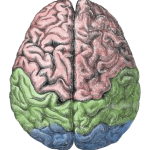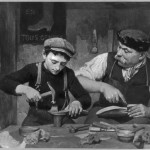Fortunately, we also know from extensive research both in the U.S. and elsewhere that when we treat teens like adults, they almost immediately rise to the challenge.
— Epstein (2007): The Myth of the Teen Brain in Scientific American Mind.
Is the angst and turmoil we usually associate with adolescence just a result of the way human brains develop, or is it something learned, and depends on the society that shapes our kids? Robert Epstein argues (Epstein, 2007) it’s the latter not the former, and, despite a lot of other research to the contrary, he may have a point. He believes the main problem is that western teens are treated more as children than young-adults, and they spend most of their time socializing with other teens and not with adults.

Alex Chediak posts a good overview of the work.
We’ve seen that one of the major problems with most psychological studies is that they only focus on WEIRD people, typically represented by college students in the Western world, who are the easiest people for university researchers to study. Using any such subset must, necessarily, be unrepresentative of the full range of human behavior. Furthermore, since society influences brain development, even studies that focus less on behavior and more on neurological imaging are likely to be affected by the some bias.
A similar argument can be made for studies of adolescence since most studies of adolescence focus on western teens. As a result, separating behavior learned via social interaction, from the regularly progression of genetically programmed brain development is going to be difficult.
Much of Epstein’s argument is based on the book Adolescence: An Anthropological Inquiry (Schlegel and Barry, 1991), which compared teens in almost 200 pre-industrial societies. Epstein summarizes this and other work to indicate that in pre-industrial cultures:
- about 60 percent had no word for “adolescence,”
- teens spent almost all their time with adults,
- teens showed almost no signs of psychopathology
- antisocial behavior in young males was completely absent in more than half these cultures and extremely mild in cultures in which it did occur.
- teen trouble begins to appear in other cultures soon after the intro- duction of certain Western influences, especially Western-style schooling, television programs and movies.
— Epstein (2007) (my bulleting): The Myth of the Teen Brain in Scientific American Mind.
As a result, teens:
learn virtually everything they know from one another rather than from the people they are about to become. Isolated from adults and wrongly treated like children, it is no wonder that some teens behave, by adult standards, recklessly or irresponsibly.

Epstein’s antidote is to treat teens like adults. I agree. However, it’s essential to keep in mind what type of adults we want them to be: responsible and logical, while retaining the creativity we usually associate with childhood. This is something that typifies the ideal of Montessori education, all the way from early-childhood up.